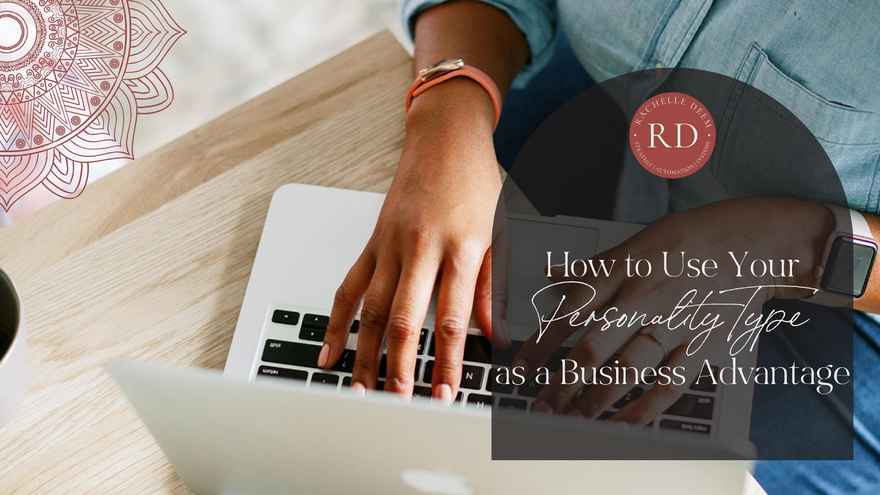How To Use Your Personality Type To Your Advantage

Have you ever done a personality quiz? I’m not talking about the ones that tell you what Harry Potter character you are. I’m talking about a Myers Brigg personality test.
I first took this personality quiz back in 2012 as part of a screening process for a corporate role. And I have been obsessed with personality profiles ever since.
I’m an INTJ – which stands for Introversion, Intuition, Thinking, Judging.
Some aspects of the INTJ personality are:
We are life-long learners. Analytical problem solvers. And we are eager to improve systems and processes with innovation. We see possibilities for improvement. And we approach many aspects of life by analyzing the theory behind it.
If you know me, you know that this is ‘on the money’. It also goes a long way to explain why I love working with business systems and processes.
Understanding the strengths and weaknesses of my personality type has given me insight into how I run my business. It also has also helped me understand how I react to things going on around me.
The strengths of an INTJ’s are: great with strategising. Being innovative. Staying steadfast and determined in the face of challenges. And having a strong desire to learn. We struggle with perfectionism. We are also not great with that work/life balance. We may also show low emotional distance, and have a superiority complex.
There are 16 personality types which come from a combination of 4 pairs of traits. You will be one of the other of each trait pair.
If you’re new to personality traits, or love learning more about it, here are the details of the 4 pairs of traits.
Introversion vs Extroversion – How you gain your energy
This isn’t about how shy or outgoing you are, but where you get your energy from.
Introverts (I) gain their energy from within themselves. Spending time around a group of people drains their energy. They need alone-time and quiet reflection to recharge.
Extroverts (E) are energised by the company of others. Too much time alone depletes them and they need to socialise to recharge their energy level.
Sensing vs Intuition – How you collect information
This trait describes how you take in and interpret information.
Sensors (S) gather this information from their immediate environment. They rely on their 5 senses, on things that are tangible and concrete.
Intuitives (N) look at the overall meaning and context. They look for patterns and connections. They see possibilities and realities that aren’t noticeable to others.
Thinking vs Feeling – How you make decisions
When it comes to making decisions, you are either a thinker or you’re a feeler.
If you have the Thinking (T) trait, you will try to solve the problem and make the decision based on logic. You don’t let your emotions get in the way in the decision-making process.
Feelers (F) are led by their emotions, their values and the perspective and needs of others.
Judging vs Perceiving – How you interact with the outside world
Contrary to popular opinion, this trait isn’t about being judgemental or perceptive. It’s about how you interact with your environment and the world around you.
Someone with a Judging (J) trait craves structure, organisation, rules and boundaries.
If you have a Perceiving (P) trait you are flexible and adaptive to what is going on in the world as you interact with it. Perceivers are reluctant to commit themselves.
For each of these 4 traits, the choice is an either/or. You are either an introvert or you're an extrovert. You are a thinker or you’re a feeler. You may feel like you are a bit of both, but in reality, one aspect of this trait will be strong than the other.
Your choice in each of these areas will give you a 4 letter code…so for me INTJ.
Here is an overview of the 16 personality types.
ENTJ - The Commander
Charismatic, direct and assertive and outspoken – driven to lead.
INTJ - The Mastermind
Independent, original, analytical, and determined.
ENTP - The Visionary
Creative, resourceful, and intellectually quick.
INTP - The Architect
Logical, original, creative thinkers.
ENFJ - The Teacher
Popular and sensitive, with outstanding people skills.
INFJ - The Counselor
Quietly forceful, original, and sensitive.
ENFP - The Champion
Enthusiastic, idealistic, and creative.
INFP - The Healer
Quiet, reflective, and idealistic.
ESTJ - The Supervisor
Practical, traditional, and organised.
ISTJ - The Inspector
Serious and quiet, interested in security and peaceful living.
ESFJ - The Provider
Warm-hearted, popular, and conscientious.
ISFJ - The Protector
Quiet, kind, and conscientious.
ESTP - They Dynamo
Friendly, adaptable, action-oriented.
ISTP - The Craftsperson
Quiet and reserved, interested in how and why things work.
ESFP - The Entertainer
People-oriented and fun-loving.
ISFP - The Composer
Quiet, serious, sensitive and kind.
It’s important to note that no personality type is better than any other, or any more desirable than any other. Each one has its own unique and valuable strengths, talents, gifts and contributions.
If you’re keen to understand more about the Myers Brigg Personality Types, check out Isabel Briggs Myers book, Gifts Differing: Understanding Personality Type.


0 comments
Leave a comment
Please log in or register to post a comment